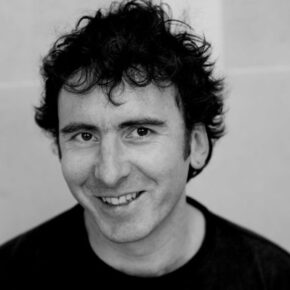Q – Hi, Mark, we’re delighted you can join us for this chat! What do you think is the hardest part of writing a book?
Mark McNay – I’m glad to be here! For me, the hardest part often changed throughout the process. Sometimes it was facing the empty space, and at others it was doing my seventh rewrite.
Q – What advice do you have for using dialogue effectively?
MM – In terms of dialogue, I would say the best thing is to read it out loud. As for how to use it in fiction, I’d save it for the high points of drama.
Q – Do you think it’s helpful to plan out what and how you’re going to write beforehand, or just leap in?
MM – I sometimes leap right in and go for it, but after a page or two I need to step back and think ‘what is my plan here?’. I find that a loose plan is the best thing to work with for longer pieces of fiction.
Q – Which comes first, the beginning or the end? Do you tend to start of with an idea of one or the other, or both, or neither?
MM – It changes for every story I write, but it often takes me until the end before I can properly write the beginning.
Q – What do you think makes a good story?
MM – A good story has a character the reader can empathise with caught in the horns of a dilemma, or in some sort of jeopardy. It’s as simple as that.
Q – I often come across blanks when writing – I know where the story is going, but I can’t find the words. Do you have any advice?
MM – Sometimes you need to keep working, sometimes you need to go for a walk, and sometimes you can write an experiment. For example, imagine if your character went into a pub. What would she order?
The best part of writing is finding a new way to express something, or to find a story and get it down. It’s also a great feeling to read something you’ve written and genuinely think it’s really good.
The most important thing is to read a lot. Read fiction, especially in the genre you want to write.
– Mark McNay
Q – What’s the best piece of advice anyone gave you when you were starting out as a writer?
MM – I would say that the most important thing is to read a lot. Read fiction, especially in the genre you want to write. Also, it’s a good idea to keep a journal and write your observations in it every day.
I’m keeping a journal at the moment about being a househusband and an old dad. It’s good fun.
Something else which is important is to begin ‘reading as a writer’. That involves watching how the writer represents characters, describes settings, reveals plot, depicts dialogue, etc.
Q – What kind of mistakes did you make when you were starting out, and how did you learn from them?
MM – My major mistake was being impatient. I wanted it all and I wanted it now. Make your story the best you can. Work is never finished. If you look at finished work in a couple of months, you will find areas to improve, so be patient, and take your time.
Write and rewrite. Let it rest. Rewrite, rewrite, rewrite…
That’s not to say that you’ll pay attention, though! I had the same advice and didn’t. I wanted it now, and I thought I was different from them. I now realise I wasn’t.
Q – How do you go about creating your characters?
MM – My characters are real people thinly disguised, or amalgamations of real people. My first real antagonist was based on a man I knew as a young adult. He had a borstal dot on his face. Just that description says it all.
You can see the tattoos on his hands, the gym reinforced body, and the criminal attitude.
Q – Do you draw mainly on your own experiences, then?
MM – I think most writers do. They may not set them out as they happened in life, but they will twist them into the environment of the story.
A story set on Mars with a man problem solving could have been written by someone who’d spent time trying to fix an old car with a few odd spanners and a lack of spare parts. That was The Martian by the way. Great book.
All my work has some basis in reality. A writer once said – their name slips my mind – that all writing is autobiography, in that it is a representation of the writer’s life.
Everything we do is useful. The way we talk to each other is the same in realist fiction as it is in science fiction.
We’ve all been dumped, or had to negotiate our way out of a conflict. The trick is seeing how our experiences have similarities, or can be generalised into the world of the story.
– Mark McNay
Q – How long does it take you to write a novel, on average?
MM – It took me three years to write my first novel and a year to write my second. My third has taken me seven so far.
Q – How do you approach plotting your stories?
MM – That’s a good question. I just wrote a short story that had the ending worked out before I started, but usually I start with a situation and move from there, working it out as I go along.
As I move forward, a loose plan comes to mind that helps guide me to the end.
I think having a loose plan is best, because it’s good to be able to negotiate between character and plot so that neither will seem too contrived. Characters need to behave in ways that are realistic.
Q – Everyone I know who writes, writes novels or short stories. Is it possible, or does it make any sense to write essays?
MM – If you want to write essays, then do it! I love a well-written essay that makes me interested in a subject, like one of the Guardian long reads. Great stuff. The argument of an essay is like the plot of a story.
Q – Thank you Mark, you’ve given us some fascinating insights!
MM – Thank you, and good luck with your writing. Keep doing it no matter what!






















